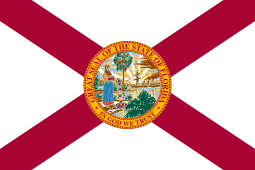Frank Clark (politician)
Frank A. Clark (March 28, 1860 – April 14, 1936) was an American lawyer and politician who served in public and private practice for some 50 years, including 20 years in the United States Congress.

Born in Eufaula, Alabama, Clark attended law school in Georgia and was admitted to the bar there in 1881, beginning in private practice in Newnan.[1]
In 1884 he moved to Florida, where he spent most of his life as a politician and lawyer in public and private practice. One year later, Clark was elected city attorney of Bartow, Polk County, Florida, for 1885-86. He returned to private practicing for three years until winning the first of two two-year terms - ten years apart - in the Florida House of Representatives.
Between the end of his first term in 1891 and his re-election in 1899, Clark worked at his law practice in-between his 1893 appointed to a four-year term as assistant U.S. attorney for Southern Florida. He then moved to Jacksonville, Florida and resumed his law practice until being re-elected to the State House. In 1900, he was elected chair of the Florida Democratic Party.
When his second term ended in 1901, Clark spent four years in private practice before being elected to the U.S. House of Representatives. The highlight of his 20-year tenure was chairing the Committee on Public Buildings and Grounds from 1913 through 1919.
During the 47th United States Congress in 1911, Clark proposed H. R. 2582, which read: "To prohibit the intermarriage of persons of the white and Negro races within the District of Columbia; to declare such contracts of marriage null and void; to prescribe punishments for violations and attempts to violate its provisions."[2]
His congressional career ended in 1925 when, despite his history as state chairman, he failed to win his party's nomination to run.
Once again Clark resumed his law practice, this time in Miami. Three years later, in 1928, President Calvin Coolidge appointed him to the U.S. Tariff Commission, where he served for two years.
In 1930, at the age of 70, Clark remained in the nation's capital and returned to practicing law, but in 1933 he became attorney for the Bureau of Internal Revenue (predecessor to the Internal Revenue Service), serving until his death at age 76.
He was returned and interred in Bartow, Florida.
References
- "Frank Clark". Retrieved 25 July 2013.
- Congress (1911), Congressional Record (http), 47, Congressional Printing Office, retrieved 2014-07-17
- United States Congress. "Frank Clark (id: C000430)". Biographical Directory of the United States Congress.
External links

| U.S. House of Representatives | ||
|---|---|---|
| Preceded by Robert Wyche Davis |
U.S. Representative Florida's 2nd congressional district 1905–1925 |
Succeeded by Robert A. Green |

